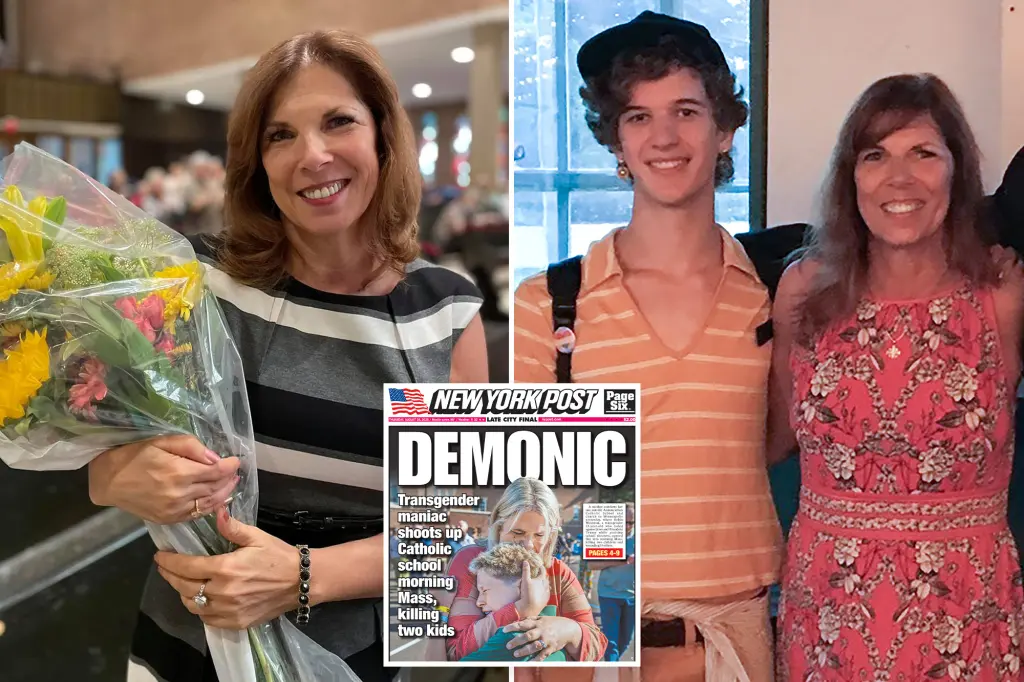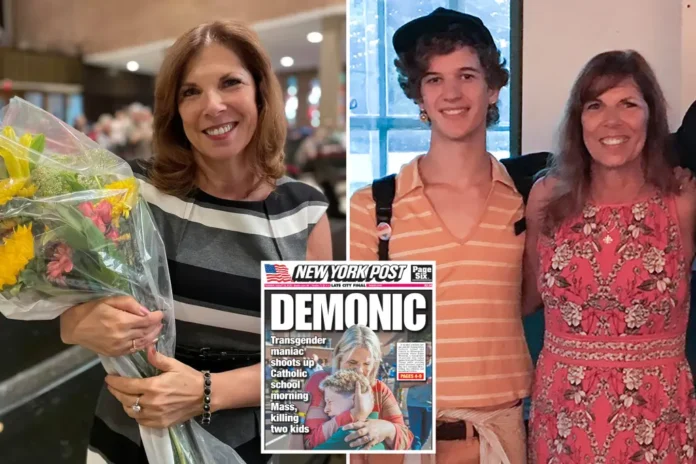😢 SHOCKING UPDATE FROM MINNEAPOLIS! 😢 The mother of the suspected school sh*oter is “completely distraught” and refusing to talk to police—what’s she hiding? 💔 As the city mourns a tragedy that claimed young lives, her silence raises haunting questions. Why won’t she cooperate? Dive into the heart-wrenching details of this unfolding story. Click to uncover more. 👉

On August 27, 2025, a devastating shooting at Annunciation Catholic School and Church in Minneapolis, Minnesota, left a community shattered. Two children, Fletcher Merkel (8) and Harper Moyski (10), were killed, and 18 others, including 14 children, were injured when 23-year-old Robin Westman opened fire during a morning Mass. Westman, who died by suicide at the scene, left behind a manifesto revealing a disturbing obsession with mass violence. As investigators piece together the motive, Minneapolis Police Chief Brian O’Hara revealed a poignant detail: the shooter’s mother, Mary Grace Westman, is “completely distraught” and has refused to cooperate with authorities. Her silence, coupled with her decision to hire a criminal defense attorney, has sparked questions about her role, her emotional state, and the broader implications of this tragedy.
The Tragedy at Annunciation
The attack unfolded just before 8:30 a.m., as students and parishioners gathered for a Mass marking the start of the school year. Armed with a rifle, shotgun, and pistol—all legally purchased—Westman fired 116 rounds through the church’s stained-glass windows, targeting those inside. Wooden planks were used to barricade side doors, trapping victims in a scene Chief O’Hara described as “absolutely incomprehensible.” A smoke bomb and writings on weapons, including anti-Catholic phrases like “Where is your God?” and antisemitic slurs, underscored the shooter’s hateful intent. The church’s policy of locking doors after Mass began likely saved lives, preventing Westman from entering the building.
The two young victims, Fletcher and Harper, were mourned deeply. Fletcher’s father, Jesse Merkel, called his son a lover of family, fishing, and sports, while Harper’s parents described her as a “bright, joyful” child whose kindness touched all. Of the 18 injured, 14 were children aged 6 to 15, with one in critical condition and others suffering from graze wounds to life-threatening injuries. The community rallied with vigils and memorials, but the pain of the loss lingered, amplified by the shooter’s connection to the school.
Mary Grace Westman’s Silence
Mary Grace Westman, the shooter’s mother, emerged as a focal point in the investigation. A former employee at Annunciation Catholic School until her retirement in 2021, she had a direct tie to the institution where her child, Robin, once attended. On August 28, Chief O’Hara told reporters that investigators had been unable to speak with Mary Grace, stating, “We have not been successful in talking to the shooter’s mother, yet, at this time.” Efforts to reach her continued, complicated by records indicating she resides in Florida. By August 29, Assistant Chief Christopher Gaiters noted that “there has been conversation” through the Minnesota Bureau of Criminal Apprehension, but he declined to elaborate, citing the ongoing investigation.
Mary Grace’s refusal to cooperate raised eyebrows, prompting her to hire Ryan Garry, a criminal defense attorney known for representing high-profile clients. Garry told Fox News that Mary Grace is “completely distraught about the situation and has no culpability” but sought legal counsel to manage police and media inquiries. This move sparked speculation about her reasons for silence. Was she overwhelmed by grief, protecting herself legally, or hiding information about her child’s descent into violence? The lack of clarity has fueled public curiosity, with some, like Erica Hassan of Defending Education, calling her non-cooperation “a shame.”
The Shooter’s Background and Manifesto
Robin Westman, who legally changed their name from Robert to Robin in 2020, citing identification as female, had no significant criminal history. Their manifesto, shared via YouTube videos and a 200-page journal written in Cyrillic script, offered a chilling glimpse into their mindset. The writings expressed a fascination with mass shooters, including Adam Lanza (Sandy Hook) and Dylann Roof (Charleston), and a desire for notoriety, describing the attack as a “masterpiece.” Hateful phrases targeting Catholics, Jews, Black people, and others adorned Westman’s weapons, though the manifesto denied racism or white supremacy as motives, stating, “I do it to please myself. I am sick.”
Westman’s mental health struggles were evident, with journal entries like “I am not well. I am not right” and “FIND ME I AM BEGGING FOR HELP.” Despite a “loving family” and recent visits to Annunciation under the pretense of reconnecting with faith, Westman’s actions suggest premeditation, including scouting the church. A former classmate recalled Westman’s childhood behavior, such as praising Hitler, as an early red flag, though the manifesto focused more on violence than ideological allegiance. The FBI, classifying the attack as domestic terrorism, noted its anti-Catholic bent, but analysts argue it aligns with nihilistic subcultures glorifying chaos over ideology.
The Role of the Mother’s Silence
Mary Grace’s refusal to cooperate has drawn attention, but her emotional state offers context. As a mother, learning that her child committed such a heinous act would be devastating, potentially explaining her distress and initial withdrawal. Her attorney’s statement that she has “no culpability” suggests she was unaware of Westman’s plans, supported by the manifesto’s claim of a “good support system.” However, her past employment at Annunciation raises questions about whether she noticed warning signs, especially given Westman’s recent visits to the church.
The decision to hire a defense attorney may reflect caution rather than guilt. Media scrutiny and public outrage can overwhelm families of perpetrators, and legal counsel helps navigate such pressure. Her Florida residence may have delayed contact, and the “conversation” noted by Gaiters suggests some progress, though details remain private. The lack of cooperation has frustrated investigators, who have interviewed dozens of Westman’s relatives and friends, including the shooter’s father, James Westman, to understand the lead-up to the attack.
Community and Societal Impact
The Minneapolis community has been left grappling with grief and anger. Vigils at Lynnhurst Park and flowers outside the church reflect a collective mourning, while survivors like 13-year-old Javen Willis, who urged classmates to hide, and a 10-year-old saved by a friend’s bravery, highlight the trauma endured. Mayor Jacob Frey rejected “thoughts and prayers,” emphasizing the victims’ faith, while Governor Tim Walz called the attack an encounter with “evil and horror.” The shooting has reignited debates over gun control, especially after the Trump administration’s $18.5 million cut to a Homeland Security prevention program, and mental health support, given Westman’s documented struggles.
Online subcultures glorifying violence, like the “True Crime Community,” are under scrutiny, as Westman’s manifesto echoed their aesthetics. References to pop culture memes and past killers suggest a performative element, designed to shock and gain infamy. Analysts urge better monitoring of such spaces and improved mental health interventions to prevent future tragedies.
Moving Forward
As the investigation continues, authorities are analyzing Westman’s devices and online activity to uncover radicalization pathways. Mary Grace’s eventual cooperation, if it occurs, could shed light on Westman’s home life, though her attorney’s stance suggests she may remain guarded. The community faces a long road to healing, with calls for policy changes to address gun access and mental health. Minneapolis stands united in supporting the victims, but the silence of the shooter’s mother lingers as a poignant reminder of the personal toll of such tragedies.
Conclusion
The Minneapolis shooting at Annunciation Catholic School is a heart-wrenching chapter in a city’s history, marked by the loss of young lives and a mother’s refusal to engage with investigators. Mary Grace Westman’s distress and silence, while understandable, underscore the complexity of understanding such acts of violence. As the community mourns and seeks answers, the focus remains on honoring the victims and preventing future tragedies. For updates and ways to support Minneapolis, follow local news and community initiatives.
